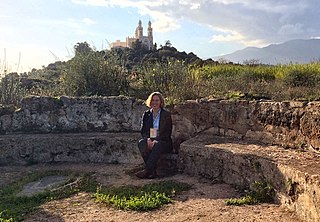Related Research Articles
Barbara Mary Levick was a British historian and epigrapher,focusing particularly on the Late Roman Republic and Early Empire. She was recognised within her field as one of the leading Roman historians of her generation.

Sextus Pompeius Magnus Pius,also known in English as Sextus Pompey,was a Roman military leader who,throughout his life,upheld the cause of his father,Pompey the Great,against Julius Caesar and his supporters during the last civil wars of the Roman Republic.

Sextus Pompeius Festus,usually known simply as Festus,was a Roman grammarian who probably flourished in the later 2nd century AD,perhaps at Narbo (Narbonne) in Gaul.
Quintus Pedius was a Roman politician and general who lived during the late Republic. He served as a military officer under Julius Caesar for most of his career. Serving with Caesar during the civil war,he was elected praetor in 48 BC and was given a triumph for victories over the Pompeians during the civil war's second Spanish campaign.

The gens Pompeia was a plebeian family at ancient Rome,first appearing in history during the second century BC,and frequently occupying the highest offices of the Roman state from then until imperial times. The first of the Pompeii to obtain the consulship was Quintus Pompeius in 141 BC,but by far the most illustrious of the gens was Gnaeus Pompeius,surnamed Magnus,a distinguished general under the dictator Sulla,who became a member of the First Triumvirate,together with Caesar and Crassus. After the death of Crassus,the rivalry between Caesar and Pompeius led to the Civil War,one of the defining events of the final years of the Roman Republic.
The Bellum Siculum was an Ancient Roman civil war waged between 42 BC and 36 BC by the forces of the Second Triumvirate and Sextus Pompey,the last surviving son of Pompey the Great and the last leader of the Optimate faction. The war consisted of mostly a number of naval engagements throughout the Mediterranean Sea and a land campaign primarily in Sicily that eventually ended in a victory for the Triumvirate and Sextus Pompey's death. The conflict is notable as the last stand of any organised opposition to the Triumvirate.
Gaius Calvisius Sabinus was a consul of the Roman Republic in 39 BC under the Second Triumvirate. He and his consular colleague Lucius Marcius Censorinus had been the only two senators who tried to defend Julius Caesar when his assassins struck on 15 March 44 BC,and their consulship under the triumvirate is taken as a recognition of their loyalty. An inscription,described by Ronald Syme as "one of the most remarkable inscriptions ever set up in honour of a Roman senator," praises Calvisius for pietas,his sense of duty or devotion. As a military officer,Calvisius is notable for his long service and competence,though he was not without serious defeats.
Susan Treggiari is an English scholar of Ancient Rome,emeritus professor of Stanford University and retired member of the Faculty of Classics at the University of Oxford. Her specialist areas of study are the family and marriage in ancient Rome,Cicero and the late Roman Republic.
Marcus Licinius Crassus was a quaestor of the Roman Republic in 54 BC. He was the elder son of Marcus Crassus who formed the political alliance known as the "First Triumvirate" with Pompeius Magnus and Julius Caesar. His mother was Tertulla,the daughter of Marcus Varro Lucullus. His father and his younger brother,Publius,died at the Battle of Carrhae in 53 BC,after which time Marcus continued to be a partisan of Caesar.

The gens Nonia was a plebeian family at ancient Rome. Its members first appear in history toward the end of the Republic. The first of the Nonii to obtain the consulship was Lucius Nonius Asprenas in 36 BC. From then until the end of the fourth century,they regularly held the highest offices of the Roman state.

The Battle of Lauro was the last stand of Gnaeus Pompeius the Younger,son of Gnaeus Pompeius Magnus,against the followers of Julius Caesar during the civil war of 49–45 BC. After being defeated during the Battle of Munda,the younger Pompeius unsuccessfully attempted to flee Hispania Ulterior by sea,but was eventually forced to land. Pursued by Caesarian forces under Lucius Caesennius Lento,the Pompeians were cornered at a wooded hill near the town of Lauro,where most of them,including Pompeius the Younger,were killed in battle.

Cynthia Ellen Murray Damon is a Professor of Classical Studies at the University of Pennsylvania and has written extensively on Latin literature and Roman historiography,having published translations and commentaries on authors such as Caesar and Tacitus.
Eleanor Winsor Leach was the Ruth N. Halls Professor with the Department of Classical Studies at Indiana University. She was a trustee of the Vergilian Society in 1978–83 and was second and then first vice-president in 1989–92. Leach was the president of the Society of Classical Studies in 2005/6,and the chair of her department (1978–1985). She was very involved with academics and younger scholars –directing 26 dissertations,wrote letters for 200 tenure and promotion cases,and refereed more than 100 books and 200 articles. Leach's research interests included Roman painting,Roman sculpture,and Cicero and Pliny's Letters. She published three books and more than 50 articles. Leach's work had an interdisciplinary focus,reading Latin texts against their social,political,and cultural context. From the 1980s onwards,she combined her work on ancient literature with the study of Roman painting,monuments,and topography.
Professor Lynette Gail Mitchell is Professor in Greek History and Politics at the University of Exeter. Mitchell is known for her work on ancient Greek politics and kingship.

Emily Joanna Gowers,is a British classical scholar. She is Professor of Latin Literature at the University of Cambridge and a Fellow of St John's College,Cambridge. She is an expert on Horace,Augustan literature,and the history of food in the Roman world.

Helen V. Lovatt is Professor of Classics at the University of Nottingham. She is known in particular for her work on Latin epic literature especially from the Flavian period.

Catherine Mary Conybeare is an academic and philologist and an authority on Augustine of Hippo. She is currently Leslie Clark Professor in the Humanities at Bryn Mawr College in Pennsylvania.
Carol C. Mattusch is the Mathay Professor of Art History at George Mason University. She is a specialist in Greek,Roman and 18th century art.
Vipsania was an ancient Roman noblewoman of the first century BC. She was married to the politician Publius Quinctilius Varus and was a daughter of Roman general Marcus Vipsanius Agrippa and his second wife Claudia Marcella Major.
Beth Severy-Hoven is Professor of the Classical Mediterranean and Middle East at Macalester College. She is an expert in Roman history and archaeology,and gender and sexuality in antiquity.
References
- ↑ "Tour Leader | Dr Kathryn Welch". Academy Travel | Tailored Small Group Journeys.
- ↑ "Caesar and Rome : a study of Roman politics and administration, 49-44 B.C. | WorldCat.org". search.worldcat.org.
- 1 2 3 4 "Staff Profile". The University of Sydney.
- ↑ "ASCS Newsletter 2013" (PDF).
- ↑ "ASCS Newsletter 2017" (PDF).
- ↑ "ASCS Newsletter, May 2021" (PDF).
- ↑ "About". The Pompeii Cast Project.
- ↑ "Sextus Pompeius". www.classicalpressofwales.co.uk.
- ↑ "AWAWS Mentors".
- ↑ "Review of: Magnus Pius: Sextus Pompeius and the Transformation of the Roman Republic. Roman culture in an age of civil war". Bryn Mawr Classical Review.
- ↑ "Review of: The alternative Augustan age". Bryn Mawr Classical Review.
- ↑ Miltsios, Nikos; Tamiolaki, Melina (19 March 2018). Polybius and His Legacy. Walter de Gruyter GmbH & Co KG. p. 343. ISBN 978-3-11-058484-4.